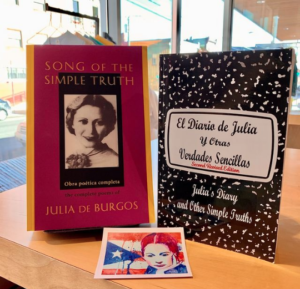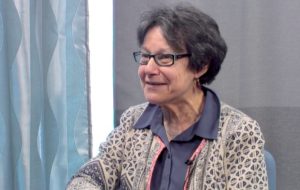This Philly symposium was born from the rich intellectual tradition — and the erasure — of Afro-Latinxs
 February 24, 2021
Category: Featured, Medium, Purpose
February 24, 2021
Category: Featured, Medium, Purpose
If you are a Philly-area Latinx, all roads eventually lead to Taller Puertorriqueño.
I realized this two summers ago, while researching the mini biographies of Latinxs to be included in Nuestra América: 30 Inspiring Latinas/Latinos Who Have Shaped the United States.
I wrote about Julia de Burgos, one of Puerto Rico’s early feminists and an influential and acclaimed Afro Latina poet — and suddenly remembered that Taller’s bookshop — one of the few places in the 19133 zip code where you can purchase newly released books and hear Latinx authors read — is named after her.
And then, as I was writing about Pura Belpré — an Afro Latina storyteller, writer and the first Puerto Rican librarian hired by the New York Public Library system — I discovered she looked forward to chatting in Spanish with her fellow Boricua Arturo Schomburg when he frequented the 135th Street branch where she worked for a while.
Schomburg, whose collection of Black literature, art and history would give rise to the Schomburg Center for Research in Black Culture, is also the namesake of the Arturo Schomburg Symposium, which takes place annually at Taller.
The symposium — this year scheduled for February 27 from 9 a.m. to 4:30 p.m. — has, from its inception in 1997, brought scholars together to help deepen and expand the discourse about the African Diaspora in Latinx cultures.
It continues the work Schomburg started in NY, “in the sense that it is a forum for the discussions and documentation of those discussions,” said Carmen Febo, the executive director of Taller. “The scholars that participate are researchers in the area of the theme chosen for the year.”
[Editor’s note: this year’s theme is “COVID-19: A Color Canvas of Inequality,” an examination of the systemic conditions that place African-descent communities most at risk in the pandemic.]
Like Burgos and Belpré — whose Black identity is frequently completely whitewashed — and Schomburg — whose Latinx identity is sometimes forgotten and his first name anglicized into Arthur — Taller’s symposium was born from erasure.
Evelyne Laurent-Perrault, assistant professor in the history department at University of California at Santa Barbara recalled for Generocity how the first symposium came into being.
She and Edgardo González (both of them Afro Latinxs), and Thomas Morton (an African American linguist who spent several years in Panamá and the Dominican Republic) became friends when she started working at Taller in January 1996.
“We often conversed about racism in Latin America and within the Latinx communities,” Laurent-Perrault said. Similar conversations with Johnny Irizarry (who was then Taller’s executive director) and others at the organization, including customers, underscored the need to address what Laurent-Perrault calls the “elephant in the room.”
“In the Fall of ’96, [I] proposed to move these informal conversations to a wider public context through an event,” Laurent-Perrault said. “Johnny loved the idea, which we proposed to the board in either October or November of that year. We held the first Schomburg Symposium in February 1997. It was Johnny Irizarry who proposed the name of Arturo Schomburg for [it].”
Both Febo and Laurent-Perrault say there was nothing like it back then.
“Even academic institutions were not fully considering Afro-Latinx or Afro-Latin American contributions,” Laurent-Perrault said. “We wanted to first render Afro Latinx people visible, we wanted to underscore the African contributions to Latin America and Latinx histories, cultures, and communities, to challenge anti-Black racism in Latinx communities, and to forge more bridges of collaboration with African American communities.”
Past symposia have explored the Afro Latinx experience and examined traditions within the African Diaspora through the arts and humanities, including:
- Afro Latinxs on the move: Migration, civil rights and politics
- Afro Latinx struggles: Pushing boundaries through engagement
- Afro-Latinas and activism: Politics, gender and race
- Common roots in dance and movement in African and Latino traditions
- Carnaval: From the religious to the secular
- Perceptions and complicity in beauty and race
- The African presence in Latin American and Caribbean contemporary visual arts
Febo estimates that symposium attendance averages 80 to 100 people on any given year, and that 60% of the attendees are Latinx and 40% African American.
One of Arturo Schomburg’s greatest impacts came through the archiving of his original collection and its subsequent accessibility for research. While Taller’s symposiums have been recorded from the first, Febo said their accessibility is a work in progress.
“All those tapes need to be digitized, catalogued and a system developed to make them accessible to researchers and students,” she told Generocity. In 2019, Taller received a two-year grant from Independence Public Media Foundation to support the effort.
“It is hard to trace our impact,” Laurent-Perrault said, “but I know that from the first Schomburg onwards, terms such as Afro Latinx and Afro Latin-American took hold in the region. University faculty had been attending the program since its inception. Several took their students as well. Activists, educators, and social workers, community members at large attend our symposium regularly.”
Laurent-Perrault added that universities have partnered with Taller at different times on the symposium, and have even hoped to move the symposium to their institutions.
“We remain faithful to hold it at Taller,” she said, “a place where everyone feels welcome.”
Trending News













